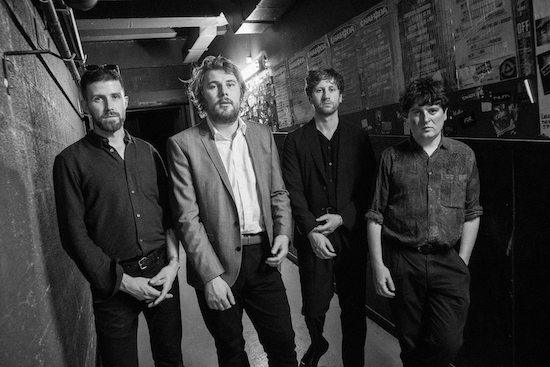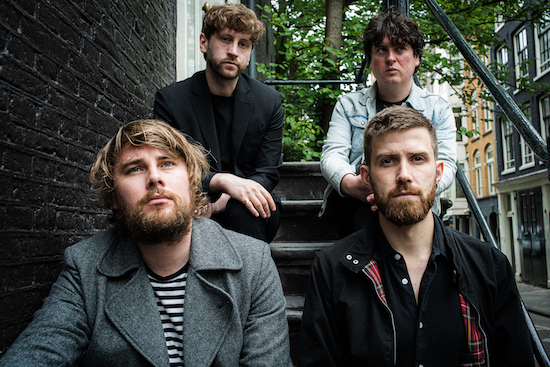Photos by Mark McGuinness
The night before sitting down with Dara Kiely and Daniel Fox of Gilla Band, I watched Moonage Daydream. A loosely structured exploration of the life and career of David Bowie via sound and vision collage, filmmaker Brett Morgan effectively pieces it together with excerpts of the musician speaking in various interviews. Bowie’s revelations about moving to Los Angeles, a place he didn’t exactly enjoy but felt important to be, in the mid-1970s were particularly poignant. I immediately thought of Gilla Band.
While the Dublin-based quartet – completed by drummer Adam Faulkner and guitarist Alan Duggan – haven’t moved to L.A. they do hold an inherent inclination towards challenging themselves within their music often pushing the boundaries both with the studio and with their selves. This October marks a decade since the release of their debut EP France 98. In that short space of time, they’ve become one of the most highly regarded bands of their generation. “It was a big surprise to us when people started citing us as an influence, it’s the highest compliment,” Kiely says humbly, when asked about their impact over the last decade. Adds Fox, “It’s a tough one because ten years is a large chunk of our lives. I guess we’re pleasantly surprised by how everything has gone. Very grateful.”
In those responses, they demonstrate a shyness and sincerity that distinguishes them from many of their contemporaries. Sitting with Kiely and Fox in the lobby of a Dublin hotel, they’re easy and fun company. In between talking about Most Normal, Gilla Band’s third record (and first release since changing their name from Girl Band due to avoid, as they put it in a statement, “propagating a culture of non-inclusivity,”) we cover a range of topics from The Rugrats Theory (“All the kids are dead and they’re a figment of Angelica’s imagination,” Fox enlightens me) to Kiely’s disdain for Manchester United (“They ruined the 90s”). The pair, friends from the age of 12, sometimes finish each other’s sentences and are endearingly self-deprecating. At the same time, they listen to each other attentively when conversation turns to the more restive experiences of making their latest record.
There are several things that make Gilla Band’s music so remarkable, but foremost among them is the arresting juxtaposition between the intensity of the music and the stream-of-consciousness lyrics delivered via Kiely’s idiosyncratic screams. Over the years, they’ve sung about chicken fillet rolls, the folk tale of the (literally) two-faced English nobleman Edward Mordake, garlic curry cheese chips, and bleached moustaches. The references within their songs have often been quotidian but made to seem unfamiliar thanks to the context they put them in. On Most Normal, however, Kiely writes more directly than before; sharing more of himself with his bandmates and audience.
He adopts a more earnest vernacular in detailing his relationship with himself. “A kind of cool word for savage is beast but the thing I hate the least is the love of hating me,” he intones on album highlight ‘The Weird’. Elsewhere, ‘Post Ryan’ is one of the most impressive moments of their career, Kiely singing candidly about feelings of inadequacy (“Cos I never understand them / When they use big words / All I do is sit there and just nod”) before leaving us with a closing refrain that reverberates long after the album ends: “Inevitable depression when I do nothing.” It’s not always comfortable to hear these frank admissions, but their humanity is extremely impactful.
I saw you playing Whelan’s in Dublin earlier this year. It was really nice seeing you in a more intimate venue. The last few times I’ve seen Gilla Band has been in bigger spaces like Vicar St. How did you find those shows?
Daniel Fox: Those gigs were a lot of fun.
Dara Kiely: We played a lot of new tracks at those shows for the first time, that was a little intimidating.
DF: Yeah, it brought us back to square one in a way. We’d played a couple of festivals at the end of last year but those Whelan’s shows were our first proper gigs in a while. It was nice to be back doing gigs and be like, ‘Ok, yeah, we’re good at playing’!
DK: I had all the lyrics on the ground. So I had to duck down and come back up quite a lot.
Speaking of festivals, Sonic City, which you’ve co-curated with Black Country, New Road and Low, is fast approaching in Belgium this month. You’re performing on the first night of the weekend. It must have been really fun to choose bands and artists for the line-up. Amongst your picks are Goat Girl, Aoife Nessa Frances, crack cloud, Les Filles de Illighadad and Dry Cleaning…
DF: That was really cool to do. It was one of our many Zoom meetings over lockdown! We each picked acts to put forward, so there’s a nice mix of bands and musicians that all four of us like.
DK: Dry Cleaning invited us on to guest on their episode of Lose Yourself on BBC 6 Music recently. We started our set with Enya’s ‘Only Time’. We’ve met them a handful of times after gigs and they’re really nice. Their guitarist Tom [Dowse] is a very unique, amazing musician. Goat Girl was one of my picks. I haven’t seen them live in ages. We played a couple of gigs with them a couple of years ago. They’re a really fun live band.
Do you listen to a lot of new music?
DK: I’m not on social media at all anymore, all I have is WhatsApp. New stuff still trickles down to me, though. Either the lads will play something or my girlfriend will show me new music. To be honest, I’m happy listening to stuff I find myself.
I got that 1001 Albums You Must Hear Before You Die book and I tried to listen to the albums chronologically. I think I got from like 1954, which was a Sinatra record, up to 1973. Which isn’t too bad. I found a lot of cool stuff from that, a lot of incredible music.
‘Capgras’, on Most Normal, actually came about from me finding a Ray Price record in that book. He’s playing a song and he starts, really earnestly, introducing the album over the song. That was where I got that idea for our song. We had this hardcore punk song that was originally called ‘Merch Core’. I took the song home with me and attempted to do a spoken word thing over the song. Some of the takes were too romantic and then I did my own version of like a director’s commentary you get on DVD bonus features. The lads were like, ‘stop taking the piss and make it somewhere between those worlds’. That’s how that song came together.
Basically, when it came to writing the record, because we were at home, I got Logic on my laptop and I’d procrastinate writing the record by writing a song of my own. I had one called ‘I Hate RyanAir’, which I now feel really bad about because over the last couple months we’ve gotten RyanAir flights and they’ve been nothing but nice to us. Anyway, I wrote some lyrics for that and I harvested the better parts from it and put them into the other song, ‘Merch Core’. Over time, I gathered enough of them and put them over the track.
When it came to recording, I did an infinite amount of takes for it which was really liberating. With the previous records, we’d have like four hours tops to do vocals and we’d be doing takes right up to the last minute. Whereas this was so different because I had time to try different things with each take. So, yeah, it was very fruitful and really fun to make. That Ray Price album was very inspiring; it’s a great record.
A recurring theme in Most Normal is coming to terms with getting older. Was that something you thought about a lot while you were writing the album?
DK: I wrote the lyrics for the album after I turned twenty-nine; I’m thirty-one now. I suppose, it was that weird moment when you’re twenty-nine and that moment is basically a year of being like, ‘I’m going to turn thirty, what’s going to happen?’ And then it happens and you’re like, ‘oh, it’s fine! Everything’s fine’. I was definitely very aware of death and balding during that period.
Have you seen The Figo Affair? There’s a bit in it where he shares a room with Pep Guardiola, now that’s how you go bald. He looks amazing. Warren Ellis, as well. He’s beautifully balding. I hope it goes that way for me. I’m looking forward to going grey, I must say.
DF: Oh, I’m well into that phase. I’ve got a good few patches!

I loved that your last album The Talkies incorporated the tones of Ballintubbert House, where you recorded it, into its atmosphere. Most Normal is fun because of how you utilised the studio as an instrument or texture, throughout. It’s almost like some of the songs are designed as listening exercises or audio to test home sound systems.
DF: There’s always loads of little things happening in the songs all the time.
Such as the high frequency pitches!
DK: That intense tinnitus sound.
DF: The upset your dog frequency.
DK: When Alan played one of the songs with that on it for the first time, I was like, ‘this is fucking horrible’.
DF: You were really annoyed about it!
DK: It ruined my day! Then I grew to love it. It’s in the album a lot, as well.
DF: There’s also a few nice moments where you’re like, ‘is my stereo broken?’ It sounds like the music has gone wrong, or something.
DK: With the kind of CD skip sound on ‘The Gum’, it took me a while, even listening back to it months later, to actually realise my phone wasn’t broken.
Did you put any challenges in your way when writing the lyrics? As a listener, we get to know you a bit more intimately on some of the songs, particularly ‘Post Ryan’. How did it feel for you to be more direct in your songwriting?
DK: Well, with The Talkies I didn’t use pronouns at all in the songs. I hadn’t heard an album do that before. There was a restriction in place and I knew that was a good thing but
they were a really difficult set of lyrics to write. This time, the initial, very loose, concept for the record was a dream, or dream-like circumstances. Sort of like the dream sequences in The Sopranos. I liked the whimsical nature of that, and writing silly things. I remember [recording engineer] Liam Mulvaney said to me years ago, “Never write things like, ‘catch me when I fall’ or ‘forever and a day’ because once you do there’s no point.” That advice really stuck with me and from there I was like, “OK, I’m going to write my own clichés.” For something like ‘Post Ryan’, though, that was interesting. That song took the longest to finish on the album.
For the first half of the song, the lyrics were all based on that kind of dreamlike world filled with silly imagery. When we finally got the second half of the song figured out – after trying so many different ways of ending it – the lads said to me that it would be really cool if I could just write something that’s very direct. For me, that felt like a moment to either sink or swim. Initially, the lyrics were like, “And all my socks are Christmas themed / I always have festive feet,” that sort of thing.
DF: And we were like, ‘maybe you should try again’!
DK: I mean, I think that’s a good lyric but in its own world. It was terrifying. I took the song home and thought, “it needs a bit more…it needs to be interesting, it can’t just be weird imagery the whole time.”
DF: Yeah, because it’s quite long and it’s all about the vocal layer in that song.
DK: I went onto Logic and eventually got the lyrics out. When I played the demo to Dan, Alan and Adam, I had to leave the room. I had written these direct lyrics and it was scary showing them because I respect them so much and their opinion matters more to me than most people.

Was it an emotional process for you, writing the lyrics?
DK: Yeah, it was. I’m quite an indirect guy. I don’t mean to be. I suppose, if you spend the last nine or ten years writing weird stuff to hide behind and creating your own metaphors then the second you start writing honestly about yourself, that whole world is opened and it’s very difficult to accept yourself in that. Sometimes I’ll listen back to tracks and go, ‘Jesus, fair play to yourself’, and other times I’ll be like, ‘Woah, you said too much’.
Another difference you encountered during the recording process for this album was that you couldn’t try the songs out at gigs and see how they worked live because of the pandemic.
DF: When we were writing the songs we just kept going with them and tried to figure them out later, but there are a couple of tunes we can’t really do live. We can’t do ‘Red Polo Neck’, we’d have to get other people in to do that with us. It’s impossible to play! I guess we have tunes on The Talkies like that, too. We can’t play ‘Aibohphobia’ live. At the same time, you don’t want to totally corner yourself when you’re trying to be creative so we try to not worry about that sort of thing too much.
DK: I think it’s important to be uncomfortable when you’re being creative. It’s not a particularly nice feeling but when it pays off it can open a lot of doors creatively. Say for example those lyrics at the end of ‘Post Ryan’, if the lads hadn’t liked them I think I would have regressed and wouldn’t have attempted to do that style again. The fact that they liked them and accepted that style opens up something else.
DF: It’s good to feel a little out of your depth. Not so far where you don’t know what you’re doing. I think I’ve heard Bowie talk about that before and it really applies; do what you’re good at but I think you should always just be a little bit scared.
DK: You’re not necessarily in the deep end, you’re in between that and the shallow end with one armband or something!
Gilla Band’s new album Most Normal is out now via Rough Trade. Along with Low and Black Country, New Road, the band are one of the curators of this year’s Sonic City Festival in Kortrijk, Belgium. The event takes place from November 11 to 13, get tickets and find out more here



